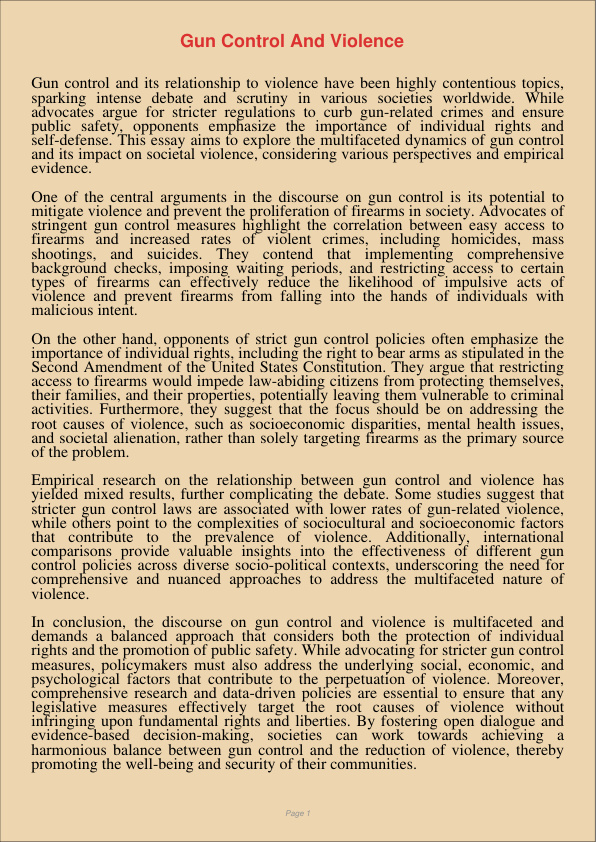Gun Control And Violence
Jan 6, 2024
gun control
violence
Biology
Health Sciences & Medicine

Gun control and its relationship to violence have been highly contentious topics, sparking intense debate and scrutiny in various societies worldwide. While advocates argue for stricter regulations to curb gun-related crimes and ensure public safety, opponents emphasize the importance of individual rights and self-defense. This essay aims to explore the multifaceted dynamics of gun control and its impact on societal violence, considering various perspectives and empirical evidence.
One of the central arguments in the discourse on gun control is its potential to mitigate violence and prevent the proliferation of firearms in society. Advocates of stringent gun control measures highlight the correlation between easy access to firearms and increased rates of violent crimes, including homicides, mass shootings, and suicides. They contend that implementing comprehensive background checks, imposing waiting periods, and restricting access to certain types of firearms can effectively reduce the likelihood of impulsive acts of violence and prevent firearms from falling into the hands of individuals with malicious intent.
On the other hand, opponents of strict gun control policies often emphasize the importance of individual rights, including the right to bear arms as stipulated in the Second Amendment of the United States Constitution. They argue that restricting access to firearms would impede law-abiding citizens from protecting themselves, their families, and their properties, potentially leaving them vulnerable to criminal activities. Furthermore, they suggest that the focus should be on addressing the root causes of violence, such as socioeconomic disparities, mental health issues, and societal alienation, rather than solely targeting firearms as the primary source of the problem.
Empirical research on the relationship between gun control and violence has yielded mixed results, further complicating the debate. Some studies suggest that stricter gun control laws are associated with lower rates of gun-related violence, while others point to the complexities of sociocultural and socioeconomic factors that contribute to the prevalence of violence. Additionally, international comparisons provide valuable insights into the effectiveness of different gun control policies across diverse socio-political contexts, underscoring the need for comprehensive and nuanced approaches to address the multifaceted nature of violence.
In conclusion, the discourse on gun control and violence is multifaceted and demands a balanced approach that considers both the protection of individual rights and the promotion of public safety. While advocating for stricter gun control measures, policymakers must also address the underlying social, economic, and psychological factors that contribute to the perpetuation of violence. Moreover, comprehensive research and data-driven policies are essential to ensure that any legislative measures effectively target the root causes of violence without infringing upon fundamental rights and liberties. By fostering open dialogue and evidence-based decision-making, societies can work towards achieving a harmonious balance between gun control and the reduction of violence, thereby promoting the well-being and security of their communities.